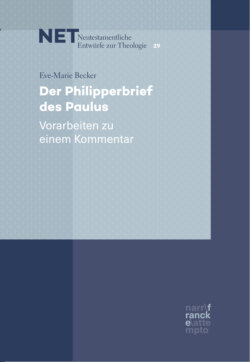Читать книгу Der Philipperbrief des Paulus - Eve-Marie Becker - Страница 30
На сайте Литреса книга снята с продажи.
Bibliography
ОглавлениеS. BartschBartsch, Shadi, The Mirror of the Self: Sexuality, Self-Knowledge, and the Gaze in the Early Roman Empire (Chicago etc.: University of Chicago Press, 2006).
G. Bertram, “Φρήν κτλ.,” in: ThWNT 9 (1973), 216-231.
H. D. BetzBetz, Hans Dieter, The Sermon on the Mount: A Commentary on the Sermon on the Mount, including the Sermon on the Plain (Matthew 5:3-7:27 and Luke 6:20-49) (Hermeneia; Minneapolis: Fortress, 1995).
H. D. BetzBetz, Hans Dieter, “Lasterkataloge/Tugendkataloge,” in: RGG4 5 (2002), 89-91.
H. BloomBloom, Harold, The AnxietySorge of Influence: A Theory of Poetry (Oxford: Oxford University Press, 19972).
J. Boswell, Christianity, Social Tolerance and Homosexuality: Gay people in Western Europe from the beginning of the Christian era to the fourteenth century (Chicago etc.: University of Chicago Press, 1980).
F. E. Brenk, “Most Beautiful and Divine: Graeco-Romans (Especially Plutarch), and Paul, on Love and Marriage,” in: Greco-Roman Culture and the New Testament. Studies Commemorating the Centennial of the Pontifical Biblical Institute (ed. D. E. Aune/F. E. Brenk; NovTSup 143; Leiden: Brill 2012), 87-111.
R. BultmannBultmann, Rudolf, “Μεριμνάω κτλ.,” in: ThWNT 4 (1942), 593-598.
R. BultmannBultmann, Rudolf, Theologie des Neuen Testaments (durchgesehen und ergänzt von O. Merk; Tübingen: Mohr Siebeck, 19849).
W. Deming, Paul on Marriage and Celibacy: The Hellenistic Background of 1 Corinthians 7 (Grand Rapids: Eerdmans, 20042).
E. R. DoddsDodds, E. R., Pagan and Christian in an Age of AnxietySorge: Some Aspects of Religious Experience from Marcus Aurelius to Constantine (Cambridge: Cambridge University Press, 1965 [repr. 1991]).
H. Flashar, Aristoteles. Lehrer des Abendlandes (München: C. H. Beck, 2013).
M. FoucaultFoucault, Michel, “Die Ethik der SorgeSorge um sich selbst als Praxis der Freiheit (transl. by H. Kocyba),” in: Ästhetik der Existenz. Schriften zur Lebenskunst (ed. D. Defert et al.; Berlin: Suhrkamp, 2007), 253-279.
T. Fuhrer, “Das ‘Zeitalter der Angst’ als Konstrukt einer Rhetorik der Verunsicherung: Eine Analyse zweier Sequenzen aus Augustins Sermones ad populum,” in: Irritationen. Rhetorische und poetische Verfahren der Verunsicherung (ed. R. Früh et al.; Philologus Suppl. 2; Berlin: de Gruyter, 2015), 61-85.
J. M. Gundry, “1 Cor 7071 Kor07:5b071 Kor07,5 in the Light of a Hellenistic-Jewish Tradition of Abstinence to ‘Devote Leisure’,” in: Paulus – Werk und Wirkung. FS f. A. Lindemann zum 70. Geburtstag (ed. P.-G. Klumbies/D. S. du Toit; Tübingen: Mohr Siebeck, 2013), 21-44.
M. HeideggerHeidegger, Martin, “Einleitung in die Phänomenologie der Religion,” in: idem, Phänomenologie des religiösen Lebens (Frankfurt: Vittorio Klostermann, 1995), 3-156.
M. HeideggerHeidegger, Martin, Sein und Zeit (Tübingen: Max Niemeyer, 199317).
F. W. Horn, “Nicht wie die Heiden! Sexualethische Tabuzonen und ihre Bewertungen durch Paulus,” in: Anthropologie und Ethik im Frühjudentum und im Neuen Testament. Wechselseitige Wahrnehmungen (ed. M. Konradt/E. Schläpfer; WUNT 322; Tübingen: Mohr Siebeck, 2014), 282-306.
L. T. Johnson, “Transformation of the Mind and Moral Discernment in Paul,” in: Contested Issues in Christian Origins and the New Testament. Collected Essays (ed. idem; Leiden: Brill, 2013), 255-275.
E. A. JudgeJudge, E. A., “Ethical Terms in St Paul and the Inscriptions of EphesusEphesus,” in: The First Christians in the Roman World. Augustan and New Testament Essays (Idem, ed. by J. R. Harrison; WUNT 299; Tübingen: Mohr Siebeck, 2008), 368-377.
F. Kolb, RomRom. Die Geschichte der Stadt in der Antike (München: C. H. Beck, 20022).
H. Kraft, Clavis Patrum Apostolicorum (Darmstadt: Wissenschaftliche Buchgesellschaft, 1964 [repr. 1998]).
G. W. H. Lampe, A Patristic Greek Lexicon (Oxford: Clarendon Press, 1972 [reprint]).
H. G. Liddell/R. Scott/H. J. Jones, A Greek-English Lexicon (Oxford: Clarendon Press, 1996rev. suppl.).
H. LöhrLöhr, Hermut, “The Exposition of Moral Rules and Principles in Pauline Letters. Preliminary Observations on Moral Language in Earliest Christianity,” in: Moral Language in the New Testament. The Interrelatedness of Language and Ethics in Early Christian Writings. Kontexte und Normen neutestamentlicher Ethik/Contexts and Norms of New Testament Ethics. Vol. 2 (ed. R. Zimmermann/J. G. van der Watt; WUNT 2.296; Tübingen: Mohr Siebeck, 2010), 197-211.
E. LohmeyerLohmeyer, Ernst, Der Brief an die Philipper (KEK 9; Göttingen: Vandenhoeck & Ruprecht, 1930/1974).
A. J. Malherbe, The Letters to the Thessalonians. A New Translation with Introduction and Commentary (AncB 32B; New York City: Doubleday, 2000).
J. H. Moulton/G. Milligan, The Vocabulary of the Greek Testament. Illustrated from the Papyri and Other Non-Literary Sources (Grand Rapids: Eerdmans, 1976 [repr.]).
U. B. MüllerMüller, Ulrich B., Der Brief des Paulus an die Philipper (ThHK 11/1; Leipzig: Evangelische Verlagsanstalt, 20022).
T. Muraoka, A Greek-Hebrew/Aramaic Two-Way Index to the Septuagint (Leuven: Peeters, 2010).
W. A. Oldfather, EpictetusEpiktet/Epictetus. Discourses Books 1-2 (LCL 131; Cambridge: Harvard University Press, 1998 [reprint]).
W. L. Petersen, “Can ΑΡΣΕΝΟΚΟΙΤΑΙ be translated by ‘Homosexuals’ (I Cor 6.9; I Tim 1.10),” in: VC 40 (1986), 187-191.
J. ReumannReumann, John, Philippians. A New Translation with Introduction and Commentary (AncB 33B; New Haven: Yale University Press, 2008).
P. L. Schmidt „Hyginus,” in: DkP 2 (1979), 1263-1264
W. Schrage, Der erste Brief an die Korinther. 2. Teilband. 1 Kor 6,12-11,16071 Kor06,12-11,16 (EKK 7/2; Neukirchen-Vluyn: Neukirchener, 1995).
R. Scott Smith/S. M. Trzaskoma, Apollodorus’ Library and Hyginus’ Fabulae. Two Handbooks of Greek Mythology (Indianapolis: Hackett Publishing, 2007).
G. TheißenTheißen, Gerd, Erleben und Verhalten der ersten Christen. Eine Psychologie des Urchristentums (Gütersloh: Gütersloher Verlagshaus, 2007).
M. E. ThrallThrall, Margaret E., The Second Epistle to the Corinthians Vol. 2 (ICC; Edinburgh: T & T Clark, 2000/2004).
V. L. Wimbush (ed.), Ascetic Behavior in Greco-Roman Antiquity. A Source Book (Minneapolis: Fortress, 1990).
D. F. Wright, “Homosexuals or Prostitutes? The meaning of ΑΡΣΕΝΟΚΟΙΤΑΙ (1 Cor 6:9071 Kor06,9; 1 Tim 1:10151 Tim01,10),” in: VC 38 (1984), 125-153.
D. ZellerZeller, Dieter, Der erste Brief an die Korinther (KEK 5; Göttingen: Vandenhoeck & Ruprecht, 2010).
